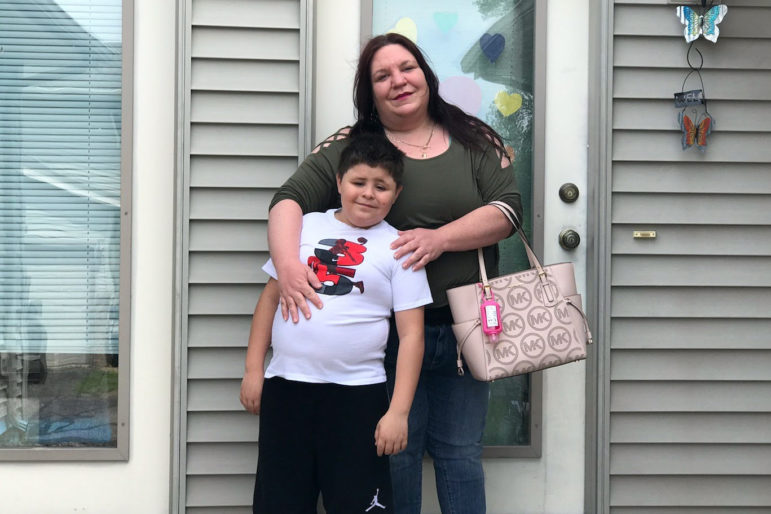People With Disabilities Still Waiting on Unemployment
Wisconsin residents left in limbo with dwindling bank accounts.

Jessica Barrera, who receives Social Security Disability Insurance (SSDI), lost her part-time job at Groome Transportation in Eau Claire, Wis., due to the pandemic. She has yet to learn about the status of her application for Pandemic Unemployment Assistance (PUA) to replace some of her lost wages. “I check every day, and nothing changed,” she says. Photo courtesy of Jessica Barrera.
After waiting more than three months for the Wisconsin Department of Workforce Development to process her unemployment claim, Lorrie Wickman grew excited when an agency adjudicator finally called on Aug. 5.
“My heart started fluttering,” Wickman said. “I was like, ‘Oh yay, yay, yay! Maybe something is going to happen.’ ”

Lorrie Wickman, 56, spent four months waiting for the Wisconsin Department of Workforce Development to deliver Pandemic Unemployment Assistance (PUA) to replace her lost income as an artist and social worker in Porterfield. The wait was capped by a two-week saga featuring lengthy phone calls, a days-long technology glitch and 32 emails to agency administrators. “Going to be a busy morning paying bills!” she said when six months of back pay finally landed in her account on Aug. 18, 2020. Photo courtesy of Lorrie Wickman.
Something did happen. But it did not send money to her dwindling bank account, at least not for another two exhausting weeks of navigating state bureaucracy. The 56-year-old artist and social worker instead learned she faced yet another hurdle before she would finally receive replacement for some of the wages she lost due to the coronavirus pandemic — even after state officials promised to aid people in Wickman’s position.
Wickman is among about 175,000 people in Wisconsin who receive federal disability assistance, officially called Social Security Disability Insurance (SSDI), to supplement their limited income. The vast majority work part-time, including Wickman, who grapples with the lingering effects of an injury she sustained on the job 10 years ago.
Wisconsin’s Republican-led Legislature in 2013 barred SSDI recipients from receiving regular unemployment benefits when they lose work. Only North Carolina has a similar ban.
During the pandemic, Wisconsin’s DWD spent months deciding whether disability recipients should qualify for a special pot of unemployment benefits: federally funded Pandemic Unemployment Assistance (PUA), created in March under Congress’ disaster stimulus bill. The program pays to expand benefits to people who lost their jobs due to the pandemic but “would not qualify for regular unemployment compensation.”
After first denying, then pausing decisions on PUA claims from people on disability, DWD on July 27 announced it received federal permission to declare the group eligible for PUA. But Wickman and similarly situated Wisconsinites are now finding that DWD procedures are leaving them waiting much longer for relief.
About 1,450 SSDI recipients applied for PUA through July 30, according to DWD spokesman Ben Jedd. The agency did not know how many of those claims it had processed, but DWD as of Aug. 14 said it issued determinations on about 64,400 of nearly 99,000 total PUA applications filed since DWD began accepting applications on April 21.
“The payment of PUA is extremely manual and depends on qualifying for the program, addressing any associated eligibility issues, and how quickly that person files weekly claims after their PUA (qualification) is established,” Jedd wrote in an email.
WPR and Wisconsin Watch spoke to nine disability recipients who applied for PUA months ago. DWD as of Tuesday had yet to deliver on eight of their claims. But Wickman on Tuesday woke up to six months of backpay in her bank account, following a four-month wait — capped by two weeks of lengthy phone calls, technology glitches and 32 emails to agency administrators.
Left waiting and feeling misled
Wickman applied for PUA when DWD began accepting applications. The Porterfield resident learned about the program from a friend and fellow artist who lives across Wisconsin’s border with Michigan’s Upper Peninsula.
The friend said he and several art colleagues qualified for the PUA in Michigan, and he suggested that Wickman should apply in Wisconsin. Wickman said selling her clay, glass and wire pieces is her main source of income. That dried up as the pandemic canceled art shows. She also lost part-time work helping elderly and disabled Wisconsinites hire in-home care staff.

Lorrie Wickman, 56, of Porterfield, Wis., says selling her clay, glass and wire pieces was her main source of income. That dried up as the pandemic canceled art shows. She also lost part-time work helping elderly and disabled Wisconsinites hire in-home care staff. Wickman and her 36-year-old son — who also has a disability — live with Wickman’s boyfriend, whose auto mechanic job has kept the household afloat while she waited on unemployment aid. She is seen here in 2011. Photo courtesy of Lorrie Wickman.
Wickman and her 36-year-old son — who also has a disability — live with Wickman’s boyfriend, whose auto mechanic job has kept the household afloat during the pandemic.
“He’s pretty much supporting both of us right now,” Wickman said. “I still get my disability, but I’m supporting two individuals on $1,000 a month, and that’s not easy at all.”
SSDI serves people who have worked and paid Social Security taxes but can no longer perform “substantially gainful activity.” Recipients are encouraged to work — so long as an employee does not earn more than $1,260 per month.
The program allows Wickman to purchase health insurance through Medicare and sends her monthly checks of about $1,000. She began drawing those benefits in 2014 after a client fell on her in 2010, breaking two vertebrae and her tailbone. (Separately, Wickman suffered heart failure in 2015, an episode in which she said she was pronounced dead four times.)
Those who qualify for PUA receive payments of $163 to $370 each week — plus the additional $600 that the federal government added to weekly unemployment checks throughout most of the pandemic. Although the extra $600 payments ended July 25, recipients can retroactively receive the assistance back to early February for unemployment caused by the pandemic.
DWD requires PUA applicants to first apply for and be denied regular unemployment benefits. Wickman said she did not initially know about that policy. But she understood she could not collect regular unemployment, so she first applied for PUA. And she waited.
DWD did not deny Wickman’s PUA claim until late July, once the federal government confirmed that people on disability could qualify. Months into her wait, she was told she must restart the process so the agency could first deny her regular benefits — those she already knows she can’t receive.
She felt misled.
“They knew I was on Social Security disability,” Wickman said. “I had the documentation from the government from filing my taxes that I get Social Security disability. So they had all that sitting there that whole time.”
After learning more about the process, Wickman promptly filed for regular benefits.
An adjudicator called days later, on Aug. 5, to tell her DWD issued that denial, delivering her next set of obstacles.
She faced a frustrating choice: Reapply for PUA and risk being sent to the back of the line in a first come, first served system. Or appeal her PUA denial and wait weeks or possibly months for a hearing.
“Within a half an hour, believe it or not, she called me back,” Wickman said.
The adjudicator said she would try to fix a glitch in Wickman’s portal. The portal updated soon after, offering Wickman a glimmer of hope.
“I actually have a lump in my throat. I’m so overwhelmed,” Wickman wrote in a Facebook message at the time. “Now if I could just see a dollar amount and payment I would be elated!!”
But she would wait another week for a resolution.
More claims in limbo
Other people on disability who filed for PUA remain in the dark about their claims status.
Jedd said his agency will prioritize claims from SSDI recipients who were already denied regular unemployment aid. But the agency does not track how many PUA claims it has processed from people on disability.

Eugene Wilson is seen outside his Madison, Wis., apartment on Aug. 12, 2020. After months of filing weekly claims without progress, the 51-year-old Madison resident says the state’s recent announcement that disability recipients might qualify for federal Pandemic Unemployment Assistance offers “some sort of hope.” Photo by Will Cioci / Wisconsin Watch.
DWD can’t just rubberstamp those claims, Jedd added. Staffers must ensure applicants meet a range of eligibility requirements. But that human review is not foolproof, applicants say.
Duane Adams was preparing for his 20th season taking tickets at Milwaukee’s Miller Park when the pandemic hit and left him without work. The 64-year-old said the Brewers pay him roughly $5,000 every summer, a useful supplement to his monthly disability checks of about $890. (SSDI recipients in 2020 averaged less than $1,259 in monthly benefits.)
Adams said he knew that his SSDI status made him ineligible for regular unemployment insurance. But he filed anyway “just to see.” He was denied and then applied for PUA.
When Wisconsin confirmed eligibility for disability recipients, he figured his claim would gain easy approval.
But on Aug. 5 he received a denial letter. The reason, in capital letters: “THE CLAIMANT HAS NOT EXHAUSTED ALL UNEMPLOYMENT INSURANCE…” for the year.
“I was surprised to see that,” Adams said, wondering how he could be penalized for failing to exhaust a benefit he had not been approved for. Adams is appealing, which could take months more.
Evan Johnson Sr., 54, filed for unemployment in March when his employer, a Penske trucking location outside of Wausau, slashed his weekly hours from 16 to four amid the pandemic.
Johnson’s coworkers faced similar cutbacks, he said, and most received unemployment insurance without incident. Johnson, who qualifies for disability due to lingering effects of a broken leg, could not draw regular benefits. But DWD denied him PUA as well, claiming he did not lose work hours due to any “qualifying COVID-19 reasons.”
Johnson said multiple calls to the state’s PUA claimant hotline and correspondence with a state lawmaker’s staff have yielded conflicting advice on how to proceed.
Others aid applicants are equally confused about next steps.
Jessica Barrera, 40, is another disability recipient waiting for PUA approval. WPR and Wisconsin Watch profiled the single mother from Eau Claire in June. Barrera, who lost months of income after losing her airport shuttle service job, has yet to learn her claim’s status.
“I check every day, and nothing changed,” she said.
Jeffery Behunin, 62, said he calls a DWD hotline daily, with no luck getting the latest on his PUA claim. The De Pere resident immediately followed the agency’s steps to apply in April after he was laid off from a job handing out food samples and demonstrating other products at Costco.
“We barely make it,” he said.
In Madison, 51-year-old Eugene Wilson expressed more optimism about his claim. After months of filing weekly claims without progress, Wilson said the state’s recent announcement that disability recipients might qualify for PUA offers “some sort of hope.”
Wilson in February lost a job he found through Opportunities, Inc., which provides jobs for people with disabilities. He is stretching his $1,100 monthly SSDI check after moving into a cheaper apartment with his support dog in April and living frugally — a point of pride.
Relief finally arrives: ‘I got paid!!!!!’
Back in Porterfield, Wickman said her adjudicator called again in mid-August to confirm that DWD was still working on her claim.
“That’s impressive. I actually found an adjudicator that really cares,” Wickman said.
Her saga ended Tuesday morning, after months of waiting, borrowing money and creating a plan to scrounge up funds by selling vegetables from a garden road stand. Wickman woke up to money in her bank account.
“I got paid!!!!! It’s in my account as of this morning!!! All back pay for last 6 months,” she wrote to a reporter. “Going to be a busy morning paying bills!”
This story comes from a partnership of Wisconsin Watch and WPR. Bram Sable-Smith is WPR’s Mike Simonson Memorial Investigative Fellow embedded in the newsroom of Wisconsin Watch (wisconsinwatch.org) , which collaborates with WPR, PBS Wisconsin, other news media and the University of Wisconsin-Madison School of Journalism and Mass Communication. All works created, published, posted or disseminated by Wisconsin Watch do not necessarily reflect the views or opinions of UW-Madison or any of its affiliates.
More about the Coronavirus Pandemic
- Governors Tony Evers, JB Pritzker, Tim Walz, and Gretchen Whitmer Issue a Joint Statement Concerning Reports that Donald Trump Gave Russian Dictator Putin American COVID-19 Supplies - Gov. Tony Evers - Oct 11th, 2024
- MHD Release: Milwaukee Health Department Launches COVID-19 Wastewater Testing Dashboard - City of Milwaukee Health Department - Jan 23rd, 2024
- Milwaukee County Announces New Policies Related to COVID-19 Pandemic - County Executive David Crowley - May 9th, 2023
- DHS Details End of Emergency COVID-19 Response - Wisconsin Department of Health Services - Apr 26th, 2023
- Milwaukee Health Department Announces Upcoming Changes to COVID-19 Services - City of Milwaukee Health Department - Mar 17th, 2023
- Fitzgerald Applauds Passage of COVID-19 Origin Act - U.S. Rep. Scott Fitzgerald - Mar 10th, 2023
- DHS Expands Free COVID-19 Testing Program - Wisconsin Department of Health Services - Feb 10th, 2023
- MKE County: COVID-19 Hospitalizations Rising - Graham Kilmer - Jan 16th, 2023
- Not Enough Getting Bivalent Booster Shots, State Health Officials Warn - Gaby Vinick - Dec 26th, 2022
- Nearly All Wisconsinites Age 6 Months and Older Now Eligible for Updated COVID-19 Vaccine - Wisconsin Department of Health Services - Dec 15th, 2022
Read more about Coronavirus Pandemic here
-
Wisconsin Lacks Clear System for Tracking Police Caught Lying
 May 9th, 2024 by Jacob Resneck
May 9th, 2024 by Jacob Resneck
-
Voters With Disabilities Demand Electronic Voting Option
 Apr 18th, 2024 by Alexander Shur
Apr 18th, 2024 by Alexander Shur
-
Few SNAP Recipients Reimbursed for Spoiled Food
 Apr 9th, 2024 by Addie Costello
Apr 9th, 2024 by Addie Costello




















